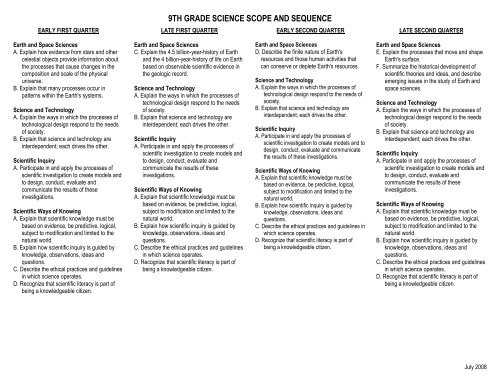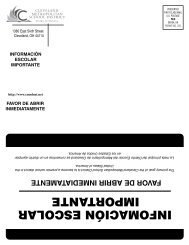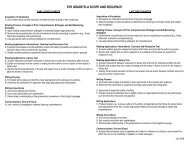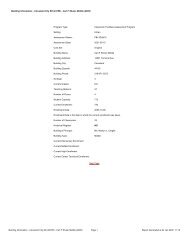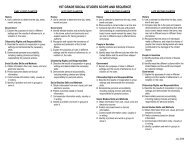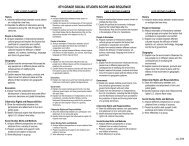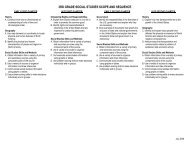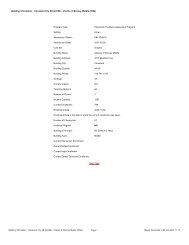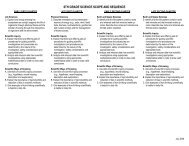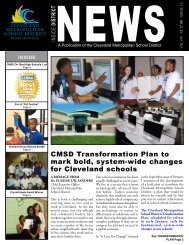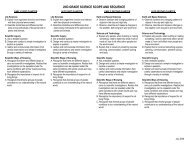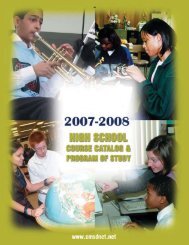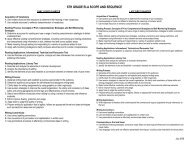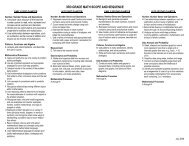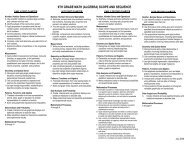9TH GRADE SCIENCE SCOPE AND SEQUENCE
9TH GRADE SCIENCE SCOPE AND SEQUENCE
9TH GRADE SCIENCE SCOPE AND SEQUENCE
Create successful ePaper yourself
Turn your PDF publications into a flip-book with our unique Google optimized e-Paper software.
EARLY FIRST QUARTER<br />
<strong>9TH</strong> <strong>GRADE</strong> <strong>SCIENCE</strong> <strong>SCOPE</strong> <strong>AND</strong> <strong>SEQUENCE</strong><br />
LATE FIRST QUARTER<br />
EARLY SECOND QUARTER<br />
LATE SECOND QUARTER<br />
Earth and Space Sciences<br />
A. Explain how evidence from stars and other<br />
celestial objects provide information about<br />
the processes that cause changes in the<br />
composition and scale of the physical<br />
universe.<br />
B. Explain that many processes occur in<br />
patterns within the Earth's systems.<br />
Science and Technology<br />
A. Explain the ways in which the processes of<br />
technological design respond to the needs<br />
of society.<br />
B. Explain that science and technology are<br />
interdependent; each drives the other.<br />
Scientific Inquiry<br />
A. Participate in and apply the processes of<br />
scientific investigation to create models and<br />
to design, conduct, evaluate and<br />
communicate the results of these<br />
investigations.<br />
Scientific Ways of Knowing<br />
A. Explain that scientific knowledge must be<br />
based on evidence, be predictive, logical,<br />
subject to modification and limited to the<br />
natural world.<br />
B. Explain how scientific inquiry is guided by<br />
knowledge, observations, ideas and<br />
questions.<br />
C. Describe the ethical practices and guidelines<br />
in which science operates.<br />
D. Recognize that scientific literacy is part of<br />
being a knowledgeable citizen.<br />
Earth and Space Sciences<br />
C. Explain the 4.5 billion-year-history of Earth<br />
and the 4 billion-year-history of life on Earth<br />
based on observable scientific evidence in<br />
the geologic record.<br />
Science and Technology<br />
A. Explain the ways in which the processes of<br />
technological design respond to the needs<br />
of society.<br />
B. Explain that science and technology are<br />
interdependent; each drives the other.<br />
Scientific Inquiry<br />
A. Participate in and apply the processes of<br />
scientific investigation to create models and<br />
to design, conduct, evaluate and<br />
communicate the results of these<br />
investigations.<br />
Scientific Ways of Knowing<br />
A. Explain that scientific knowledge must be<br />
based on evidence, be predictive, logical,<br />
subject to modification and limited to the<br />
natural world.<br />
B. Explain how scientific inquiry is guided by<br />
knowledge, observations, ideas and<br />
questions.<br />
C. Describe the ethical practices and guidelines<br />
in which science operates.<br />
D. Recognize that scientific literacy is part of<br />
being a knowledgeable citizen.<br />
Earth and Space Sciences<br />
D. Describe the finite nature of Earth's<br />
resources and those human activities that<br />
can conserve or deplete Earth's resources.<br />
Science and Technology<br />
A. Explain the ways in which the processes of<br />
technological design respond to the needs of<br />
society.<br />
B. Explain that science and technology are<br />
interdependent; each drives the other.<br />
Scientific Inquiry<br />
A. Participate in and apply the processes of<br />
scientific investigation to create models and to<br />
design, conduct, evaluate and communicate<br />
the results of these investigations.<br />
Scientific Ways of Knowing<br />
A. Explain that scientific knowledge must be<br />
based on evidence, be predictive, logical,<br />
subject to modification and limited to the<br />
natural world.<br />
B. Explain how scientific inquiry is guided by<br />
knowledge, observations, ideas and<br />
questions.<br />
C. Describe the ethical practices and guidelines in<br />
which science operates.<br />
D. Recognize that scientific literacy is part of<br />
being a knowledgeable citizen.<br />
Earth and Space Sciences<br />
E. Explain the processes that move and shape<br />
Earth's surface.<br />
F. Summarize the historical development of<br />
scientific theories and ideas, and describe<br />
emerging issues in the study of Earth and<br />
space sciences.<br />
Science and Technology<br />
A. Explain the ways in which the processes of<br />
technological design respond to the needs<br />
of society.<br />
B. Explain that science and technology are<br />
interdependent; each drives the other.<br />
Scientific Inquiry<br />
A. Participate in and apply the processes of<br />
scientific investigation to create models and<br />
to design, conduct, evaluate and<br />
communicate the results of these<br />
investigations.<br />
Scientific Ways of Knowing<br />
A. Explain that scientific knowledge must be<br />
based on evidence, be predictive, logical,<br />
subject to modification and limited to the<br />
natural world.<br />
B. Explain how scientific inquiry is guided by<br />
knowledge, observations, ideas and<br />
questions.<br />
C. Describe the ethical practices and guidelines<br />
in which science operates.<br />
D. Recognize that scientific literacy is part of<br />
being a knowledgeable citizen.<br />
July 2008
EARLY THIRD QUARTER<br />
<strong>9TH</strong> <strong>GRADE</strong> <strong>SCIENCE</strong> <strong>SCOPE</strong> <strong>AND</strong> <strong>SEQUENCE</strong><br />
LATE THIRD QUARTER<br />
EARLY FOURTH QUARTER<br />
LATE FOURTH QUARTER<br />
Physical Sciences<br />
A. Describe that matter is made of minute<br />
particles called atoms and atoms are<br />
comprised of even smaller components.<br />
Explain the structure and properties of<br />
atoms.<br />
Science and Technology<br />
A. Explain the ways in which the processes of<br />
technological design respond to the needs<br />
of society.<br />
B. Explain that science and technology are<br />
interdependent; each drives the other.<br />
Scientific Inquiry<br />
A. Participate in and apply the processes of<br />
scientific investigation to create models and<br />
to design, conduct, evaluate and<br />
communicate the results of these<br />
investigations.<br />
Scientific Ways of Knowing<br />
A. Explain that scientific knowledge must be<br />
based on evidence, be predictive, logical,<br />
subject to modification and limited to the<br />
natural world.<br />
B. Explain how scientific inquiry is guided by<br />
knowledge, observations, ideas and<br />
questions.<br />
C. Describe the ethical practices and guidelines<br />
in which science operates.<br />
D. Recognize that scientific literacy is part of<br />
being a knowledgeable citizen.<br />
Physical Sciences<br />
B. Explain how atoms react with each other to<br />
form other substances and how molecules<br />
react with each other or other atoms to form<br />
even different substances.<br />
C. Describe the identifiable physical properties<br />
of substances (e.g., color, hardness,<br />
conductivity, density, concentration and<br />
ductility). Explain how changes in these<br />
properties can occur without changing the<br />
chemical nature of the substance.<br />
Science and Technology<br />
A. Explain the ways in which the processes of<br />
technological design respond to the needs<br />
of society.<br />
B. Explain that science and technology are<br />
interdependent; each drives the other.<br />
Scientific Inquiry<br />
A. Participate in and apply the processes of<br />
scientific investigation to create models and<br />
to design, conduct, evaluate and<br />
communicate the results of these<br />
investigations.<br />
Scientific Ways of Knowing<br />
A. Explain that scientific knowledge must be<br />
based on evidence, be predictive, logical,<br />
subject to modification and limited to the<br />
natural world.<br />
B. Explain how scientific inquiry is guided by<br />
knowledge, observations, ideas and<br />
questions.<br />
C. Describe the ethical practices and guidelines<br />
in which science operates.<br />
D. Recognize that scientific literacy is part of<br />
being a knowledgeable citizen.<br />
Physical Sciences<br />
D. Explain the movement of objects by applying<br />
Newton's three laws of motion.<br />
E. Demonstrate that energy can be considered<br />
to be either kinetic (motion) or potential<br />
(stored).<br />
F. Explain how energy may change form or be<br />
redistributed but the total quantity of energy<br />
is conserved.<br />
Science and Technology<br />
A. Explain the ways in which the processes of<br />
technological design respond to the needs<br />
of society.<br />
B. Explain that science and technology are<br />
interdependent; each drives the other.<br />
Scientific Inquiry<br />
A. Participate in and apply the processes of<br />
scientific investigation to create models and<br />
to design, conduct, evaluate and<br />
communicate the results of these<br />
investigations.<br />
Scientific Ways of Knowing<br />
A. Explain that scientific knowledge must be<br />
based on evidence, be predictive, logical,<br />
subject to modification and limited to the<br />
natural world.<br />
B. Explain how scientific inquiry is guided by<br />
knowledge, observations, ideas and<br />
questions.<br />
C. Describe the ethical practices and guidelines<br />
in which science operates.<br />
D. Recognize that scientific literacy is part of<br />
being a knowledgeable citizen.<br />
Physical Sciences<br />
F. Explain how energy may change form or be<br />
redistributed but the total quantity of energy<br />
is conserved.<br />
G. Demonstrate that waves (e.g., sound,<br />
seismic, water and light) have energy and<br />
waves can transfer energy when they<br />
interact with matter.<br />
Science and Technology<br />
A. Explain the ways in which the processes of<br />
technological design respond to the needs<br />
of society.<br />
B. Explain that science and technology are<br />
interdependent; each drives the other.<br />
Scientific Inquiry<br />
A. Participate in and apply the processes of<br />
scientific investigation to create models and<br />
to design, conduct, evaluate and<br />
communicate the results of these<br />
investigations.<br />
Scientific Ways of Knowing<br />
A. Explain that scientific knowledge must be<br />
based on evidence, be predictive, logical,<br />
subject to modification and limited to the<br />
natural world.<br />
B. Explain how scientific inquiry is guided by<br />
knowledge, observations, ideas and<br />
questions.<br />
C. Describe the ethical practices and guidelines<br />
in which science operates.<br />
D. Recognize that scientific literacy is part of<br />
being a knowledgeable citizen.<br />
July 2008


